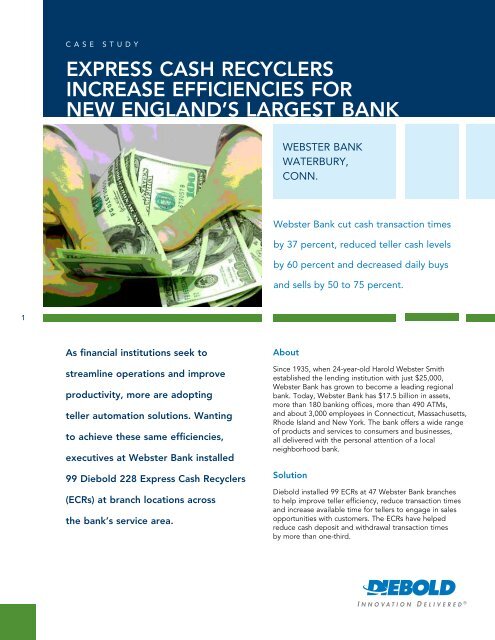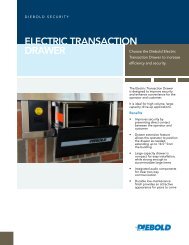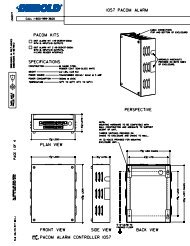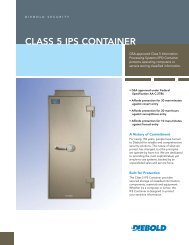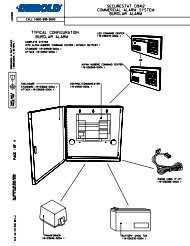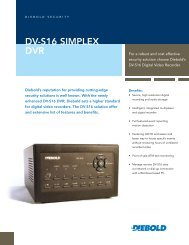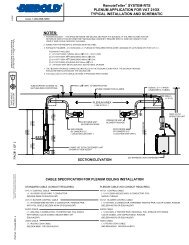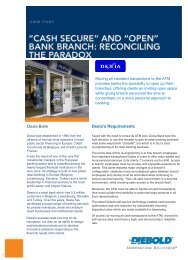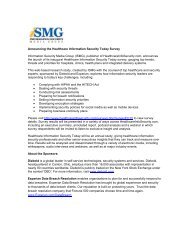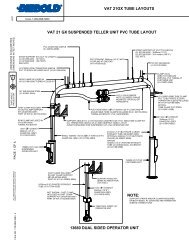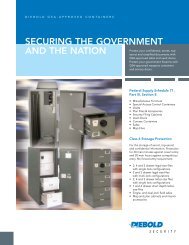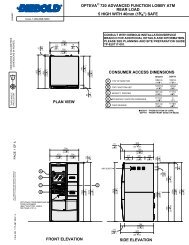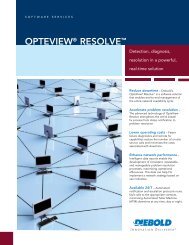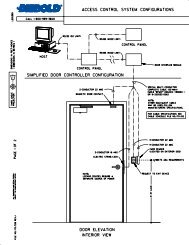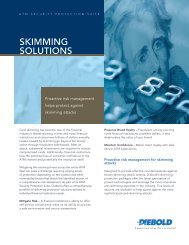Express Cash Recyclers Increase Efficiencies ... - Diebold
Express Cash Recyclers Increase Efficiencies ... - Diebold
Express Cash Recyclers Increase Efficiencies ... - Diebold
You also want an ePaper? Increase the reach of your titles
YUMPU automatically turns print PDFs into web optimized ePapers that Google loves.
1<br />
C A S E S T U D Y<br />
ExpRESS CASh RECyClERS<br />
InCREASE EffICIEnCIES foR<br />
nEW EnglAnD’S lARgESt BAnk<br />
As financial institutions seek to<br />
streamline operations and improve<br />
productivity, more are adopting<br />
teller automation solutions. Wanting<br />
to achieve these same efficiencies,<br />
executives at Webster Bank installed<br />
99 <strong>Diebold</strong> 228 <strong>Express</strong> <strong>Cash</strong> <strong>Recyclers</strong><br />
(ECRs) at branch locations across<br />
the bank’s service area.<br />
WEBSTER BANK<br />
WATERBURY,<br />
CoNN.<br />
Webster Bank cut cash transaction times<br />
by 37 percent, reduced teller cash levels<br />
by 60 percent and decreased daily buys<br />
and sells by 50 to 75 percent.<br />
About<br />
Since 1935, when 24-year-old Harold Webster Smith<br />
established the lending institution with just $25,000,<br />
Webster Bank has grown to become a leading regional<br />
bank. Today, Webster Bank has $17.5 billion in assets,<br />
more than 180 banking offices, more than 490 ATMs,<br />
and about 3,000 employees in Connecticut, Massachusetts,<br />
Rhode Island and New York. The bank offers a wide range<br />
of products and services to consumers and businesses,<br />
all delivered with the personal attention of a local<br />
neighborhood bank.<br />
Solution<br />
<strong>Diebold</strong> installed 99 ECRs at 47 Webster Bank branches<br />
to help improve teller efficiency, reduce transaction times<br />
and increase available time for tellers to engage in sales<br />
opportunities with customers. The ECRs have helped<br />
reduce cash deposit and withdrawal transaction times<br />
by more than one-third.
2<br />
C A S E S T U D Y W E B S T E R B A N K<br />
<strong>Cash</strong> recycling technology provides greater control<br />
over cash within a financial institution, while reducing<br />
inefficiencies associated with traditional cash operations.<br />
<strong>Cash</strong> Recycling Enhances<br />
transaction Efficiency<br />
Webster Bank wanted to speed up transaction times<br />
to provide better service for its consumer and business<br />
customers in Connecticut and Massachusetts. Improved<br />
transaction efficiency would not only help move<br />
customers through lines more quickly, but it would<br />
also give tellers more time to sell additional bank<br />
services to those consumers.<br />
New England’s largest independent commercial bank<br />
contracted <strong>Diebold</strong> to install ECRs at 47 of its branches.<br />
Bank officials chose branches that typically experience<br />
the highest volume of cash transactions, as they<br />
believed those locations would garner the most<br />
significant benefits from cash recycling.<br />
<strong>Cash</strong> recycling technology provides greater control<br />
over cash within a financial institution, while reducing<br />
inefficiencies associated with traditional cash operations.<br />
With its small undercounter footprint, <strong>Diebold</strong>’s<br />
ECRs accept cash, verify authenticity and sort by<br />
denomination at the point of transaction. Acting<br />
as an extension of the vault, ECRs are fully secure,<br />
safeguarding cash deposits. The units dispense that<br />
same cash for customer withdrawals. Because the units<br />
act as vaults, bank tellers are able to manage buys<br />
and sells on their own, without the traditional dual<br />
controls that require the services of a vault teller as<br />
well as counting bills by hand multiple times. The result,<br />
productivity is maximized allowing tellers to focus on<br />
the customer’s needs.<br />
Less time devoted to cash counting and balancing<br />
gives Webster Bank tellers more time to build customer<br />
relationships. While ECRs replace the tedium of cash<br />
counting, tellers can focus on sales and service to<br />
better meet customers’ needs. They now have time<br />
to inquire about their customers’ personal saving goals<br />
or recommend new services such as money market<br />
accounts and certificates of deposit. This ability to<br />
deliver more personalized attention can lead to stronger<br />
customer relationships that result in more profitable<br />
business opportunities.<br />
“Our goal was to reduce the handling time of cash<br />
transactions,” said Carol Loughrey, vice president, retail<br />
operations manager, Webster Bank. “The ECRs make<br />
tellers more efficient, giving them more time to spend<br />
talking with our customers and truly improving the<br />
quality of the service that we’re offering.”<br />
Data Reveals Surprising <strong>Efficiencies</strong><br />
Going into the ECR installation project, Webster Bank<br />
knew it would reduce transaction times – but not by how<br />
much. Working with <strong>Diebold</strong>, bank officials analyzed its<br />
cash deposit and cash withdrawal transactions.<br />
In less than one month, average transaction times for<br />
completing cash deposits into checking and money<br />
market accounts dropped 36 percent for Webster Bank<br />
after installing <strong>Diebold</strong>’s ECRs. In addition, the bank<br />
realized a 22 percent increase in transaction efficiency<br />
for check cashing transactions.<br />
Webster Bank was very pleased with these results.<br />
However, both <strong>Diebold</strong> and the bank knew cash<br />
withdrawal times could be reduced even further.<br />
Using a Lean Six Sigma approach, the parties engaged<br />
in a review of the bank’s current procedures and<br />
identified areas in which it could realize additional time<br />
savings to achieve maximum efficiency. The resulting<br />
recommendations led to new standardized procedures<br />
that ultimately helped the bank reduce cash-back<br />
withdrawal transactions an additional 15 percent.<br />
That’s a 37 percent improvement from the original<br />
transaction average.
3<br />
C A S E S T U D Y W E B S T E R B A N K<br />
In addition to the significant reduction in transaction<br />
time realized, Webster Bank found it was able to reduce<br />
teller drawer cash levels by 60 percent.<br />
The additional reduction in check cashing transaction<br />
times is due, in part, to a procedural change that allows<br />
tellers to let the <strong>Diebold</strong> ECRs automatically determine<br />
best mix of bill denominations for withdrawals. This<br />
eliminates the need for tellers to enter a specific number<br />
of bills for each denomination. However, tellers still<br />
have the option to provide customers with specific<br />
denominations if requested.<br />
In addition to the significant reduction in transaction<br />
time realized, Webster Bank found it was able to reduce<br />
teller drawer cash levels by 60 percent. Because the<br />
ECRs serve dual functions, as vaults and recyclers, tellers<br />
need less cash on hand and the recycler reduces the<br />
number of cash trades needed in the branch. In fact,<br />
Webster’s branches are realizing a 50 to 75 percent<br />
decrease in daily buys and sells after installing the <strong>Diebold</strong><br />
ECRs. As an added bonus to tellers, lower cash amounts<br />
in drawers means a significant reduction in the time it<br />
takes to balance at the end of a shift.<br />
Raw Data Reveals <strong>Efficiencies</strong>*<br />
tellers Benefit from <strong>Cash</strong> Recycling<br />
Webster Bank branch managers are pleased with the<br />
efficiencies realized by implementing cash recycling<br />
technology, and tellers are even more thrilled with the<br />
technology.<br />
Many of the comments received from tellers indicated<br />
a reduced level of stress in conducting their jobs.<br />
That may very well lead to improved job satisfaction<br />
and employee retention. Teller comments included:<br />
• “I’ve been counting for 19 years. I’m thrilled<br />
I no longer have to count anymore.”<br />
• “It’s great. We don’t have to worry about outages<br />
any longer.”<br />
• “I love it. It’s easy to use and simple to learn.”<br />
The efficiencies realized by installing <strong>Diebold</strong> ECRs<br />
have helped Webster Bank meet its goal of increased<br />
teller face time with customers. Tellers no longer need<br />
to spend time counting cash and can instead interact<br />
with customers and offer additional bank products.<br />
In addition, tellers are better able to cope with the long<br />
lines that congregate during busy bank hours, knowing<br />
that the lines will diminish more quickly now that ECRs<br />
are in place.<br />
Transaction Activity Percent Reduction Annual Average Time Savings per Branch<br />
<strong>Cash</strong> Deposits 36 percent 329 hours<br />
<strong>Cash</strong> Withdrawals 37 percent 487 hours<br />
* Data collected during <strong>Diebold</strong>’s Lean Six Sigma event.
4<br />
looking Ahead<br />
Looking to maximize the value adding potential of its<br />
teller automation project, Webster Bank is continuing<br />
to test and implement improvements identified through<br />
the Lean Six Sigma process. Additional sites are also<br />
being evaluated for future <strong>Diebold</strong> ECR installations<br />
that will help improve customer service and cash flow<br />
throughout the branch.<br />
Webster Bank follows its brand promise of “We Find<br />
a Way.” Through the installation of <strong>Diebold</strong>’s ECRs,<br />
the bank has certainly found a way to improve<br />
customers’ experiences, and in the process, realized<br />
operational efficiencies for its branches.<br />
Call on <strong>Diebold</strong> for the latest in product, service and security solutions.<br />
Since 1859, <strong>Diebold</strong> has put the customer first.<br />
Contact Information:<br />
<strong>Diebold</strong>, Incorporated<br />
5995 Mayfair Rd<br />
North Canton, Ohio 44720<br />
E-mail: info@diebold.com<br />
www.diebold.com<br />
© <strong>Diebold</strong>, Incorporated, 2009. All rights reserved.<br />
Litho in USA. 12.09<br />
<strong>Cash</strong> Recycling Benefits<br />
By implementing <strong>Diebold</strong> 228 <strong>Express</strong> <strong>Cash</strong><br />
<strong>Recyclers</strong> in 47 of its highest cash volume<br />
branches, Webster Bank realized the following<br />
benefits:<br />
• faster and more accurate transactions –<br />
<strong>Cash</strong> transaction times were reduced by<br />
more than one-third.<br />
• Elimination of teller cash counting –<br />
Tellers let the machines do the counting<br />
so they can focus on customer service.<br />
• <strong>Increase</strong>d customer face time for cross<br />
selling – With less time devoted to counting<br />
cash, Webster Bank tellers have improved<br />
customer service and interaction.<br />
• Reduction in balancing time due to lower<br />
cash amount in drawer – The bank reduced<br />
teller drawer cash levels by 60 percent.<br />
• Employee satisfaction – Tellers have less<br />
stress related to money counting and<br />
handling.<br />
• Reduced robbery exposure – <strong>Diebold</strong> ECRs<br />
reduce exposure of cash throughout<br />
Webster Bank branches and limit tellers<br />
to accessing minimal amounts of cash at<br />
a time. In addition, ECRs provide vault-<br />
level security to teller stations as the units<br />
are equipped with UL 291 Level 1 safes.<br />
• Enhanced counterfeit detection – ECRs<br />
inspect notes for authenticity, and the bank<br />
has identified several counterfeit notes<br />
directly at the point of contact.


